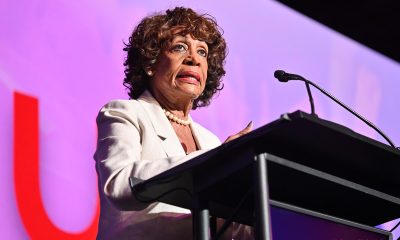News
Memorial for Rose Greene, lesbian checkbook activist, set for August 4


The LGBT community often fetes its celebrity top-donors at black tie and gown galas to show gratitude for helping grow or keep an organization afloat. Less well-recognized are the cadre of volunteer board members, checkbook activists who are just as dedicated to serving the LGBT movement as any grassroots activist, but other than a line at the bottom of their LinkedIn profile, prefer to lead and work in the background to make things happen.
Rose Greene was such a leader. She served twice on the Los Angeles LGBT Center’s Board of Directors from 1989-1995 and 2006-2011, critical times in the LA LGBT movement’s history. Only with her death on July 11 is the community learning the depth of her commitment and her contribution—which will no doubt be recounted at her memorial service on Sunday, August 4 at the Renberg Theatre at The Village at Ed Gould Plaza, 1125 McCadden Place in Hollywood. The service, officiated by Rabbi Denise Eger, will begin at 1 pm.
Greene died of bone cancer, said Lorri L. Jean, CEO of the Los Angeles LGBT Center. She was 72.
Rose Greene was an Angelino. Born in 1946 to a father who owned a cement company and a mother who died when she was 12, Greene attended Fairfax High School, graduated from Cal State Northridge in 1968 with a bachelor’s in fine arts, then briefly taught photography at Hamilton High School, according to an obituary in the Los Angeles Times.

In 1985, she graduated from the University of Southern California after studying personal financial planning. She subsequently founded her own business, Greene Group Financial, based in Santa Monica, which used a team approach to developing personalized plans for clients. She also promoted Community on her webpage.
“Rose believes passionately that one must give back to their community and encourages all of her clients to do the same. To that end, when Rose is not in the office, you’ll find her advising non-profits on their endowments and capital campaigns,” says the outdated post. She also believed in walking the talk.

Rose Greene, Helena Ruffin, Cousin and Client Mark Samara (and Maggie and Gabriel of course) participate in the 32nd annual July 4th, 5k and 10K run/walk benefiting Will Rogers Park. Everyone crossed the finish line, Gabe and Maggie however needed a little escorting.
Greene came out in the 1960s, Jean told The Times. It was a time of significant political and cultural turmoil and change with protests against the war in Vietnam and the music revolution reflecting and fueling it from Frank Zappa; Jim Morrison and The Doors; Carole King; The Byrds; Buffalo Springfield; Crosby, Stills, Nash & Young; Joni Mitchell and so many others centered in LA, West Hollywood and Laurel Canyon on and just off the Sunset Strip.
And yet homophobia and homo-hatred were still a constant during the “Make Love, Not War” generation. There were still violent gay bars raids such as at the Black Cat Tavern in 1967 and the very public murder of a gay nurse named Howard Efland by LAPD cops at the SRO Dover Hotel in downtown LA on March 9, 1969—a murder the Coroner called an “excusable homicide.” There were also organized public protests by such out gay leaders as Rev. Troy Perry and Morris Kight, captured on film by film activist Pat Rocco.
It was against this backdrop that Rose Greene developed her sense of community spirit. She was always forthright and honest. She wasn’t afraid to be herself, Jean told The Times.
Women’s Liberation movement was also developing at this time and Greene’s path was actually more lesbian-feminist focused than gay.
“I recruited Rose to work on our first women’s event — the June Swoon — almost as soon as I became executive director [of the Los Angeles Gay and Lesbian Community Services Center] in 1888 and onto the Board shortly thereafter,” longtime LGBT and political activist Torie Osborn tells the Los Angeles Blade. “I’d known her from around the lesbian community since the ’70s. She was a passionate feminist who was highly skeptical that the Center could transform into a place welcoming lesbians, as well as gay men.
“I watched her become more and more of a leader, more and more of an advocate for the Center, and more and more outspoken and militant,” says Osborn. “When we all hit the streets in October of 1991, in response to Gov. Pete Wilson’s veto of AB 101 [the gay civil rights bill he’d promised to sign], there was Rose, angry and loud, chanting and marching with the rest of us. She served as female co-chair of the Board during my tenure and brought her terrific business acumen, great humor and common sense to us at a time we needed all of it. She carried the hopes and dreams of the lesbian-feminist world into the Center with power, passion and purpose. She was a key figure at a key time in Center history.”
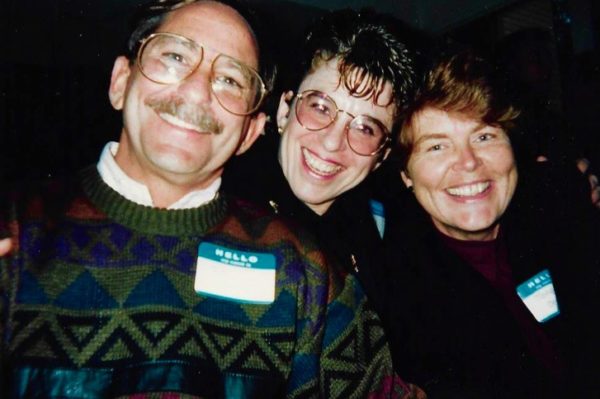
LA Gay and Lesbian Community Services Center Board co-chairs Ed Gould and Rose Greene with Center Executive Director Torie Osborn at event for the historic Capital Campaign. (Photo by Karen Ocamb)
Greene and Board co-chair Ed Gould followed the hard work of Board stalwart Karen Siteman who, with Mason Sommers, kicked off and led the first-ever LGBT capital campaign to buy the 44,000-square-foot old IRS building on the Hollywood street later renamed for longtime Center supporter and Board member, Judge Rand Schrader. Ironically, the IRS declined to grant the Center non-profit status in 1972, but did grant it on appeal after then-Center executive director Don Kilhefner promised that the Center would not advocate for homosexuality, only gay consciousness raising.
Schrader, who announced he was HIV positive in November 1991, joined LA City Councilmember Mike Woo, Board co-chair Ed Gould, Center Board member Will Halm (partially obscured in this photo), LA County Supervisor Ed Edelman, Center Board co-chair Rose Green (a stand out in white), actress Judith Light, Executive Director Torie Osborn, and LA County Assessor Kenny Hahn for the ribbon cutting ceremony in November 1992 for what became the Center’s headquarters at the McDonald/Wright Building.
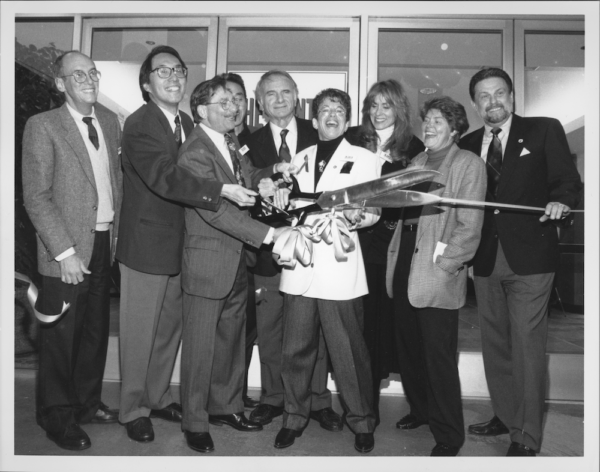
Unbeknownst to most caught up in the historic ceremony was that the Center’s incoming executive director, attorney and FEMA San Francisco-based director Lorri L. Jean, was in the audience.
“I’ll never forget that day in the summer of 1992 when my San Francisco office phone rang, and it was Rose whom I had never met. Her mission was to recruit me to apply for the job of Executive Director at the Center. Her passion was infectious. Her commitment impressive. She succeeded, and that pivotal moment changed my life,” Jean says. The success of that first-ever Capitol Campaign “inspired others throughout the nation, among them the New York LGBT Center and the Human Rights Campaign.”
It inspired Greene, too, deciding to mount a second capital campaign to raise $15 million to purchase a $6.7-million Hollywood complex at 1125 N. McCadden Place and renovate it.
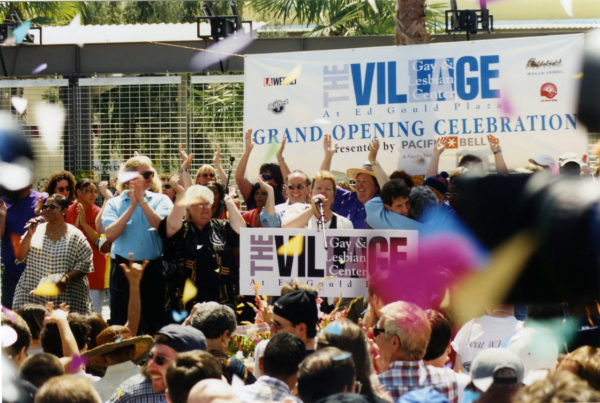
On June 21, 1998, it opened as The Village at Ed Gould Plaza, along with a $10-million endowment fund. Additionally, in 1993, Greene helped lead the Center in opening the Jeffrey Goodman Special Care Clinic, which expanded free and comprehensive early intervention HIV and AIDS medical care when AIDS was still crashing all around LA in the second wave of AIDS, according to Jean.
Perhaps Greene’s greatest legacy – that few know about – is her central significance in creating and developing the first California AIDS Ride in 1994. The 545-mile bike ride from San Francisco to Los Angeles, now known as the popular AIDS/LifeCycle, has raised more than $280 million for HIV/AIDS- related services at the Center and the San Francisco AIDS Foundation.
But it took Rose Greene to trigger the launch.
In an email to friends and supporters, Dan Pallotta, now leader in “transformation technologies,” writes about how he “originally developed the concept of the AIDSRide — an epic, multi-day, 4-figure pledge journey — for Israel’s Weizmann Institute of Science, but they didn’t feel it was for them at the time. It sat on the shelf for a year or so until Torie Osborn hired me to help with the fundraising for the Los Angeles Gay & Lesbian Community Services Center.” Then, in January of 1993, he saw the movie, “Alive” and his life changed.
“It reminded me of the power of doing the impossible. Of the human hunger to go after the unreasonable result,” Pallotta writes. I decided immediately that it was time to make the AIDSRide happen and the next Monday my team and I began researching how to move, feed, house, shower and otherwise care for hundreds or thousands of people in the outdoors over the course of a week. And how to get them to agree to do it in the first place.”
New director Lorri Jean was looking for a signature event and the young event planner brought the idea to Jean and Development Director Joel Safranek.
“We had a deck for the concept, the cover of which read, ‘The road from San Francisco to Los Angeles is paved with $600,000,’ which was what we thought it could net the first time around,” Pallotta writes. “When the idea was ready, I asked myself, ‘Who will have the vision to really get this?’ That’s where Rose Greene came in — a woman diminutive in inches and enormous in spirit — an investment manager who sat on the board of the Center and with whom I had become friends while we were raising money for the Center’s capital campaign together.
“I took her out for lunch in Hollywood and explained the idea to her,” Pallotta writes. “She got it and she and Ed Gould, the board chair at the time, helped to shepherd it through board approval to get the $50,000 in risk capital we needed to launch it.”
Approval did not come easily. Greene had to convince one board member, in particular, who wanted to studying the proposal first before making any commitment.
“You know the type,” Pallotta writes his friends. “Makes covering your ass sound like absolute saintly virtue and integrity. But Rose had a strong entrepreneurial business sense about her. And she knew that the way you study something that has never been done before is singular and simple: you do it.”
Pallotta says that his idea for a multi-day pledge event “that I showed to Rose that day in the late winter of 1993, has raised in excess of $2 billion for causes from AIDS to breast cancer to pediatric cancer, suicide prevention and more.”
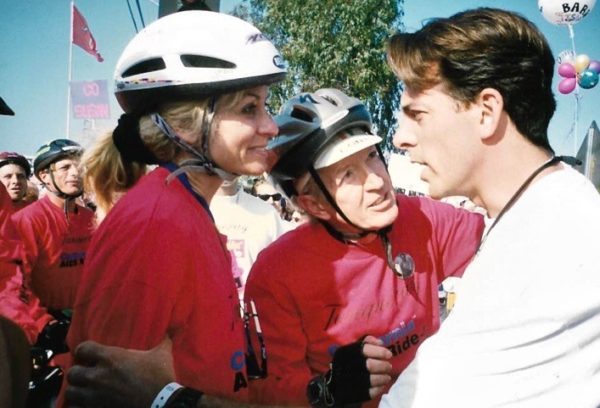
Dan Pallotta with actress Judith Light and her manager Herb Hamsher who rode the last portion of the first AIDS Ride (Photo by Karen Ocamb)

West Hollywood receives thousands of first AIDS Riders and their supporters. (Photo by Karen Ocamb)
“If Rose Green had not been there, I’m not sure it ever would have happened, at least not at that moment or for that organization. She understood the importance of taking a risk, and the rest of the board took comfort in her confidence,” he writes.
Greene’s courage and confidence in taking a risk when necessary to bring about change should serve as a model for others, Pallotta says.
“For all of the thought leadership that has been proffered about social change and risk since 1993, not too much has changed. Peoples’ attitudes toward risk is mostly still, ‘Sure, I’ll take a risk, so long as I know it’s all going to work out.’ But that is not the nature of risk. Rose Greene understood that, before the term ‘social enterprise’ ever even really existed. She was a mensch. A kindred spirit. Authentic. Full of real integrity and a sense of possibility. She loved life and living,” Pallotta writes.
“And damned if she didn’t actually ride the whole 575 miles with us in that very first AIDSRide. By the way, it didn’t net the $600,000 we had projected. It netted $1,013,000,” Pallotta writes. “The world needs more Rose Greenes.”
Greene continued to believe in the power of informed risk-taking. In January, she posted on her Rose Green Cfp Facebook page: “An important, exceptional excerpt about risk from the Behavioral Investor by Daniel Crosby. Remember this paragraph when thinking about investing for the long term (because thinking short term, reacting to negative moves in the market, will easily ruin your chances of success).”
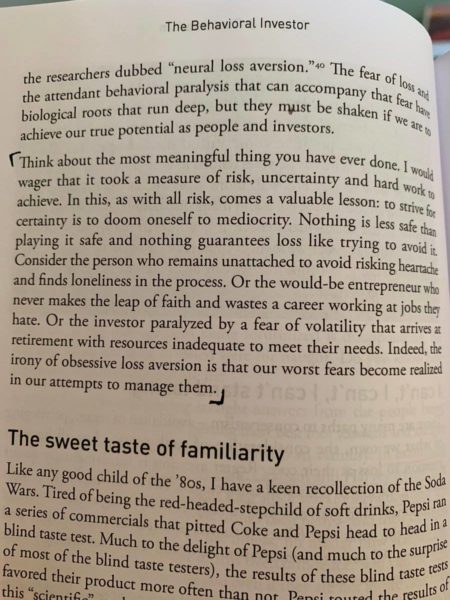
Greene left the Center Board in 1995, but returned 11 years later in 2006, serving until 2011. During that time, California wrestled with marriage equality and then the war over Prop 8 in 2008.
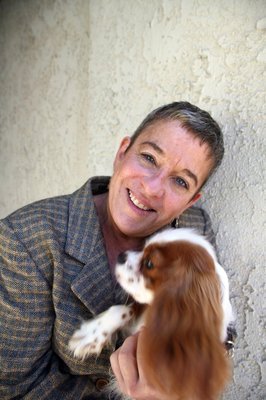
Greene married Helena Ruffin on June 17, 2008, the day after same-sex marriage was officially legalized in California, before Prop 8 was put on the November 2008 ballot.
“Rose taught me to live my authentic life,” Ruffin told The Times, crediting Greene with helping her come out.
“Rose would tell me: ‘The more we tell people who we are, the easier it will be for us to be accepted,’” Ruffin said. For Greene, “it was always about advocacy and always finding places for people who were cast out, and making sure they could find a home and place to be… she fought for people to be treated as equals.”
That sense of equality extended to family. She and Ruffin broke up about 10 years ago but never got divorced and remained very close friends, including with Ruffin’s partner, Shari Robins.
“It’s been a difficult few months to say the least. As many of you know my partner Helena was brutally attacked on March 2nd in an attempted carjacking. The first person I called was Rose Greene, a women who had become my dear friend, and was the wife of, you guessed it Helena. It was complicated, but never for us. Rose was a 4 time cancer survivor and the first time we met, Helena and I promised her we would always take care of her,” Robins wrote on her Facebook page after Greene passed away, detailing how often they all stayed and traveled together.
“We had a really good thing going the 3 of us. When she discovered she had developed a type of bone leukemia, related to all the chemo she had endured, she vowed to do what was needed to make a 5th defense of this insipid disease. She was a fighter,” she wrote. Sadly things did not improve and Rose had really had enough. She agreed to give treatment one more week…. On Monday Helena got a call that things had gone south, Rose’s kidneys were failing. Tuesday Helen said I had to get to LA and I managed to get an earlier flight on Thursday AM Rose was hanging on. I got the COH at 7. O’clock in the car I ordered Din Tai Fung, our special comfort food, to arrive at the hospital when I arrived. Rose was still with us. Helena was telling Rose all day that I was coming and she held on.
“Helen and I and Bernadette, our caregiver, held Rose’s hand and prayed in 3 religions, me Jewish, Helena AntiochIan Orthodox and Bernadette Christian. We let her know she was good to go and that she had fought so admirably hard. She passed peacefully at 9:23 pm on July 11th.
“Our hearts are broken she will be dearly missed. I love you Rosie. Hope you are enjoying that Med Men and Tequila in the sky. Xo Rest In Peace Hon.”
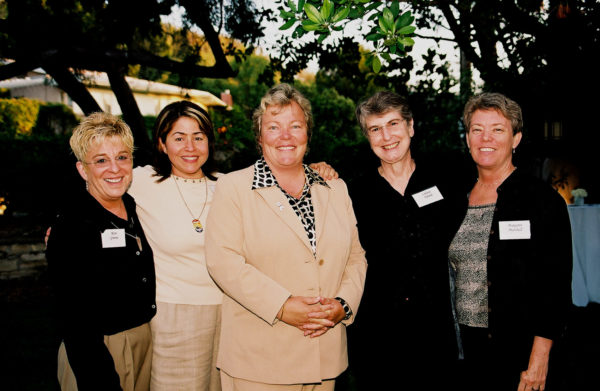
Rose Greene; Helena Ruffin; Lorri L. Jean; Lillene Fifield; and Margaret Marshall (Photo courtesy Los Angeles LGBT Center)
“Rose left this Earth way too early at the age of 72. But she went out fighting following a stem cell transplant in her quest to defeat bone cancer,” Jean says. “The Center is what it is today, thanks in part to Rose’s leadership and vision….Today the Center lauds this tireless champion of the oppressed, this extraordinary, amazing, powerful, hilarious, and loving woman. May she rest in peace.”
Peace and happiness may be what she sought most for herself, her friends, family and clients to enjoy. Last February 27, she posted this on her Facebook business page:
“Our desire for happiness is something we all have in common.
As advisors we have the remarkable connections, intelligence, experience and technology, among other things, to help you plan for the future and invest for retirement but it is compassion that is our most important trait. Our concern for others’ well-being, our clients, whom are our family.
“Cooperation comes from friendship, friendship comes from trust, and trust comes from kindheartedness. Once you have a genuine sense of concern for others, there’s no room for cheating, bullying, or exploitation; instead, you can be honest, truthful, and transparent in your conduct. Be compassionate.” -Dalai Lama”
Five days earlier, she posted this photo, seeing herself and life in perspective: “It’s Friday! There’s a crisp chill in the air but skies are clear and blue. We can see the Hollywood sign all the way from Santa Monica. Though it really isn’t that far away when you look at the actual distance….”

Please note: this article was corrected to indicate that it was Karen Siteman, with Mason Sommers, who launched and did much of the hard work purchasing the old IRS building.
Los Angeles
A new “queer summer camp” cycling event rises from the legacy of AIDS/LifeCycle
The LA LGBT Center will host its first ever “Center Ride Out,” a 3-day community cycling adventure from Los Angeles to San Diego.

On April 24, 500 cyclists will meet at Elysian Park before dawn, stretching and preparing for a 110-mile ride through urban scenery and rolling hills. They will be part of the Los Angeles LGBT Center’s inaugural “Center Ride Out,” a 3-day journey that takes riders through Los Angeles and Temecula, reeling to a stop at the San Diego LGBT Community Center.
The cycling adventure is a rejuvenating, communal queer experience that taps into the importance of shared joy and advocacy in the fight to defend LGBTQ+ rights. Its roots are sacred for many queer elders: Center Ride Out rises from the legacy of the cherished AIDS/Life Cycle (ALC), a seven-day cycling adventure from San Francisco to L.A. that formed in 1994 and ended with its last ride in 2025.
In its 31-year run, ALC riders raised over $300 million for HIV and AIDS resources, services, and awareness. This year, Center Ride Out provides a new, exciting extension of this important event, allowing cyclers to raise funds in support of the LA LGBT Center, The San Diego LGBT Community Center, and the LGBTQ Community Center of the Desert.
This support is crucial as LGBTQ+ organizations face a new crisis: widespread defunding. In the last fiscal year, the LA LGBT Center lost $9 million in federal support, according to its CEO Joe Hollendoner. The funding raised by Center Ride Out’s participants will help offset this loss and keep the organization’s various programs and services, from gender affirming care and HIV prevention resources to LGBTQ+ senior and youth support, afloat. “We anticipate further divestment in our work by the Trump administration, [so Center Ride Out] allows people to align their own personal passions with our mission in a broader way,” Hollendoner told the Blade.
Altogether, Center Ride Out participants will cover nearly 200 miles of ground together. At the end of the first 110-mile day from L.A. to Temecula, where riders will get to look at historic landmarks and embark on a museum lunch stop together, the day culminates at campgrounds at Lake Skinner.
Here, riders can take a full rest day at their lakeside camp, where it will exude queer summer camp vibes. There will be massage and medical services, arts and crafts activities, dance parties, and time to relax and connect with the community. “Folks [can] build relationships, have some fun, and feel safe. That’s a feeling a lot of people [need] right now, especially our trans and nonbinary siblings,” Hollendoner said.
Day 3 ends with an 87-mile downhill, coastal ride through the town of Rainbow in northern San Diego County, before ending with a celebratory bash at the San Diego LGBT Community Center.
Hollendoner rode ALC five times while it was active and is excited to be part of this new legacy from its very beginning. “I’ve heard our community elders talk about how powerful it was to be at the start of AIDS/LifeCycle, and the idea that I can be here at the start of Center Ride Out, an event that I hope will go for three decades or longer…It feels really exciting to me,” Hollendoner said.
For newcomers and experienced cyclists alike, Center Ride Out aims to provide an accessible experience: paring down the initial weeklong ALC ride to three days. To take part, cyclists are expected to raise $2,500 by April 10. For those who may struggle to reach this minimum, staff members have established a community fund.
The community fund will also provide scholarships for BIPOC, trans, women, and femme participants — historically underrepresented communities at ALC — as well as microgrants for BIPOC and trans-led teams to encourage a diverse range of cyclists.
Come April, scores of queer cyclists will get to experience this adventure together: one that is both storied and fresh in its purpose, lineage, and joyful expression of queer togetherness. “Center Ride Out is providing an exciting opportunity for people to not only fight back and be in community with one another, but to build resiliency and be surrounded by people who share values around liberation,” Hollendoner said.
To learn how to register, donate to or volunteer for Center Ride Out, more information can be found here. The three-day adventure takes place from April 24 to April 26.
Kristie Song is a California Local News Fellow placed with the Los Angeles Blade. The California Local News Fellowship is a state-funded initiative to support and strengthen local news reporting. Learn more about it at fellowships.journalism.berkeley.edu/cafellows.
Los Angeles
Stonewall Young Democrats bounces back from “quiet year” with Hero Awards

On Saturday, Feb. 7, the Stonewall Young Democrats (SYD), an organization that mobilizes and fosters community for young, LGBTQ+ people, hosted its “Hero Awards” ceremony at Beaches West Hollywood. Under luminous pink light, vibrant crowds of community members showed up to support and celebrate people and organizations spearheading LGBTQ+ visibility, change, and livelihood across L.A. County. Political figures filled the venue wall to wall, including LA Mayor Karen Bass, West Hollywood Mayor John Heilman, West Hollywood Council Member John Erickson, and California Assemblymember Rick Zbur.

Several local advocates and politicians were honored for their queer advocacy and leadership, including City of Los Angeles LGBTQ+ community affairs liaison Carla Ibarra, L.A. Democratic Party Chair Mark Ramos, Congressman Mark Takano, and L.A. County LGBTQ Commission Chair Sydney Rogers. The Los Angeles Blade was also recognized with an Impact Award.
Los Angeles Blade publisher Alexander Rodriguez accepted the award. In his acceptance speech, Rodriguez shared, “We report on and share the struggles of our queer community. We also get to see the resilience and strength our community has, even in the face of adversity. We see firsthand the importance of the Stonewall Young Democrats and the amazing network of people they have put together, as seen here today.”

The Stonewall Young Democrats formed in 2004, immortalizing the 1969 Stonewall riots in its name. The decision to carry the legacies of early gay rights movements is poignant: queer resistance and their enduring battle against political and social marginalization and violence are seared into the organization’s core.
SYD’s President Kanin Pruter is keeping this link to the past alive; it’s a reminder of the interconnectedness of the queer community. “Our history is there for a reason,” Pruter told the Blade. “Without lesbians during the AIDS crisis, we would not be where we are today. And our movement was started by Black trans women.”
This recent Hero Awards marks SYD’s revitalization. After a relatively quiet year, its board is excited to grow its organization, recruit diverse and eager LGBTQ+ folks, and create fruitful opportunities for everyone in the organization to develop their political advocacy and organizing skills.

Most importantly, Pruter hopes that SYD can be a safe, inclusive, and accessible space for any LGBTQ+ person who has felt outcast before. “In a loving and joking way, we’re an island of misfit toys,” Pruter said, who is intentional about creating environments where queer folks who have experienced trauma, isolation, and exclusionary social politics can fit in and belong.
“I want folks to be open, vulnerable and leave any preconceived notions at the door. We come in here [and] we are who we are. We respect each other’s identity, and we’re here to foster a culture where everyone feels welcome.”
Pruter encourages young LGBTQ+ people who are interested in getting involved in SYD, to contact him and learn more about the organization. More information can be found here.
Kristie Song is a California Local News Fellow placed with the Los Angeles Blade. The California Local News Fellowship is a state-funded initiative to support and strengthen local news reporting. Learn more about it at fellowships.journalism.berkeley.edu/cafellows.
Philippines
Philippines Supreme Court rules same-sex couples can co-own property
Advocacy group celebrated landmark decision

The Philippines Supreme Court in a landmark ruling said same-sex couples can co-own property under the country’s Family Code.
The Philippine News Agency on Tuesday notes the court issued its ruling in the case of two women who bought a house in Quezon City, a suburb of Manila, the Filipino capital, before they broke up.
The two women, according to the Philippine News Agency, “agreed to sell the property” after they ended their relationship, “and the registered owner — the respondent — signed a document acknowledging that the other partner paid for half of the purchase and renovations.” The Philippine News Agency notes “the registered owner” later “refused to sell the property and withdrew her earlier acknowledgment of co-ownership, prompting the other partner to file a complaint.”
A Regional Trial Court and the Philippines Court of Appeals ruled against the plaintiff.
The Supreme Court in a 14-page ruling it issued on Feb. 5 overturned the decisions. The Supreme Court published its decision on Tuesday.
“Considering that there is co-ownership between petitioner and respondent, then each co-owner may demand at any time the partition of the thing owned in common, insofar as her share is concerned,” said the Supreme Court in its ruling, according to the Philippine News Agency. “Having rightful interest over the subject property, petitioner has the right to demand the division of the subject property.”
The predominantly Catholic country’s Family Code defines marriage as “a special contract of permanent union between a man and a woman entered into in accordance with law for the establishment of conjugal and family life.” It also states in Article 148 that “in cases of cohabitation” outside of marriage, “only the properties acquired by both of the parties through their actual joint contribution of money, property, or industry shall be owned by them in common in proportion to their respective contributions.”
“In the absence of proof to the contrary, their contributions and corresponding shares are presumed to be equal,” it reads.
The BBC reported the Supreme Court ruling states this provision “applies to all forms of co-habitation,” regardless of the couple’s gender. A Supreme Court press release indicates the decision notes lawmakers and the Filipino government “must address same-sex couples’ rights, as courts alone cannot resolve all related policy concerns.”
“This court does not have the monopoly to assure the freedom and rights of homosexual couples,” it reads. “With the political, moral, and cultural questions that surround the issue concerning the rights of same-sex couples, political departments, especially the Congress must be involved to quest for solutions, which balance interests while maintaining fealty to fundamental freedoms.”
LGBT Pilipinas, a Filipino advocacy group, welcomed the ruling.
“This ruling marks a monumental step forward in the legal recognition of LGBTQ+ families and relationships in the country,” it said in a statement.
LGBT Pilipinas added the ruling “lays a crucial legal foundation for broader recognition of same-sex relationships and strengthens the push for comprehensive anti-discrimination protections.”
“This is a win not only for the LGBTQ+ community, but for fairness and justice in Philippine society as a whole,” said the group.
New York
Pride flag removed from Stonewall Monument as Trump targets LGBTQ landmarks
The new NPS policy targets Pride flags amid consistent efforts from the Trump administration to minimize LGBTQ history

A rainbow Pride flag flying at the Stonewall National Monument in New York was removed at the direction of Trump administration officials at the National Park Service, according to a source familiar with the matter who spoke to the Blade on condition of anonymity.
The source said the move had been in the works for weeks and is part of ongoing efforts by the Trump-Vance administration to erase LGBTQ identity from federally controlled landmarks.
In response to the Blade’s request for information about the new flag policy, the National Park Service provided the following statement:
“Current Department of the Interior policy provides that the National Park Service may only fly the U.S. flag, Department of the Interior flags, and the Prisoner of War/Missing in Action flag on flagpoles and public display points. The policy allows limited exceptions, permitting non-agency flags when they serve an official purpose. These include historical context or reenactments, current military branch flags, flags of federally recognized tribal nations affiliated with a park, flags at sites co-managed with other federal, state, or municipal partners, flags required for international park designations, and flags displayed under agreements with U.S. Citizenship and Immigration Services for Naturalization ceremonies.”
The statement also included official guidance on the display of non-agency flags issued by Trump-appointed National Park Service Director Jessica Bowron.
The Blade reached out to other organizations to confirm the status of the Pride flag last week, including the Stonewall National Monument Visitor Center, the NYC Landmarks Preservation Commission, and the National Parks Conservation Association. None were able to provide details about whether the flag was still flying at that time but it has since been removed.
This action aligns with other moves targeting and erasing LGBTQ history. In September, the Blade reported that three organizations originally slated to receive more than $1.25 million from the National Park Service’s Underrepresented Communities Grant Program would no longer receive funding: In Washington, D.C., the Preservation League had been awarded $75,000 to document LGBTQ+ historic resources. In Providence, R.I., the Preservation Society was slated for $74,692 to conduct an LGBTQ+ survey and prepare a National Register nomination. And in New York, the Fund for the City of New York, Inc., had been awarded $32,000 to nominate the residence of Bayard Rustin — the iconic civil rights and LGBTQ activist — as a National Historic Landmark.
Florida
Disney’s Gay Days ‘has not been canceled’ despite political challenges
GayDays is moving forward with its planned LGBTQ meet-up

Gay Days in Orlando is preparing for its 2026 gathering though organizers have yet to release full details.
Concerns emerged about the status of the annual meetup of LGBTQ people at Walt Disney World in Orlando, Fla., after social media posts and multiple news outlets reported the event would not take place this year.
In response to inquiries from the Blade, Josh Duke, co-owner of Gay Days, clarified that an update would come this week.
“At this time, I’d like to clarify that Gay Days Orlando has not been canceled,” an email to the Blade said. “We are currently finalizing details regarding our plans for 2026 and will be making an official announcement later this week.”
Earlier this week, Gay Days posted about a pause in their plans for the annual meeting, which quickly gained traction online.
In an official statement on social media, Gay Days organizers cited several factors behind what had initially appeared to be a cancellation of their 2026 event.
“Changes to our host hotel agreement, the loss of key sponsorship support, and broader challenges currently impacting LGBTQIA+ events nationwide made it impossible to deliver the experience our community deserves,” organizers wrote. However, the statement added, “This is a pause — not an ending.”
In a longer message shared with supporters, organizers elaborated on that now-reversed decision.
“Gay Days Family — it is with very heavy hearts that we share Gay Days 2026 will not take place this year. This was an incredibly difficult decision and one that was only made after every possible option was explored.
“Gay Days has always been more than an event — it is community, family, and a place where so many memories are made. While this pause is painful, it also gives us the opportunity to step back, listen, and begin shaping a stronger and reimagined GayDays for the future. Thank you for your continued love, patience, and support. This is not goodbye — it’s a reset, and we look forward to creating the future of GayDays together.”
GayDays, which began in 1991, encourages queer Disney fans to visit the Orlando theme park while wearing red shirts to identify one another. Originally focused on gay men reclaiming the childhood joy often denied due to homophobia, the event has expanded over the years to include LGBTQ+ families on summer vacations and queer couples honeymooning in the Magic Kingdom.
Disney made history in 2019 by holding its first-ever official Pride event at its European park, Disneyland Paris. In 2023, Disneyland California hosted the first U.S. official Pride event.
Concerns about the potential cancellation had arisen amid broader challenges affecting LGBTQ events nationwide. These include changes in hotel agreements, sponsorship support, and Florida’s increasingly restrictive anti-LGBTQ policies under Gov. Ron DeSantis. Florida currently has an equality score of -3.00 out of 49 from the Movement Advancement Project, which evaluates states based on policies affecting relationship and parental recognition, nondiscrimination, religious exemptions, LGBTQ youth, healthcare, criminal justice, and transgender identity documentation.
Recent legislation in Florida has included prohibitions on hormone replacement therapy for transgender minors, restrictions on adult access to treatment, bans on drag performances for those under 18, bathroom bans for transgender people in state buildings, and expansion of the Parental Rights in Education Act, commonly called the “Don’t Say Gay” law. These measures limit public school instruction or discussion about sexual orientation and gender identity.
Gay Days Anaheim is scheduled to take place at Disneyland Resort in September.
Disney has also maintained a focus on Pride, reporting in 2022 that proceeds from Pride merchandise benefited numerous LGBTQ organizations, including GLSEN, PFLAG, The Trevor Project, Zebra Coalition, the Los Angeles LGBT Center, the LGBT Center Orange County, the San Francisco LGBT Center, and the Ali Forney Center. Pride merchandise sold internationally supports local LGBTQ organizations in those regions.
More details about this event are expected to be released on Friday.
Italy
Olympics Pride House ‘really important for the community’
Italy lags behind other European countries in terms of LGBTQ rights

The four Italian advocacy groups behind the Milan Cortina Winter Olympics’ Pride House hope to use the games to highlight the lack of LGBTQ+ rights in their country.
Arcigay, CIG Arcigay Milano, Milano Pride, and Pride Sport Milano organized the Pride House that is located in Milan’s MEET Digital Culture Center. The Los Angeles Blade on Feb. 5 interviewed Pride House Project Manager Joseph Naklé.
Naklé in 2020 founded Peacox Basket Milano, Italy’s only LGBTQ+ basketball team. He also carried the Olympic torch through Milan shortly before he spoke with the Blade. (“Heated Rivalry” stars Hudson Williams and Connor Storrie last month participated in the torch relay in Feltre, a town in Italy’s Veneto region.)
Naklé said the promotion of LGBTQ+ rights in Italy is “actually our main objective.”
ILGA-Europe in its Rainbow Map 2025 notes same-sex couples lack full marriage rights in Italy, and the country’s hate crimes law does not include sexual orientation or gender identity. Italy does ban discrimination based on sexual orientation in employment, but the country’s nondiscrimination laws do not include gender identity.
ILGA-Europe has made the following recommendations “in order to improve the legal and policy situation of LGBTI people in Italy.”
• Marriage equality for same-sex couples
• Depathologization of trans identities
• Automatic co-parent recognition available for all couples
“We are not really known to be the most openly LGBT-friendly country,” Naklé told the Blade. “That’s why it (Pride House) was really important for the community.”
“We want to use the Olympic games — because there is a big media attention — and we want to use this media attention to raise the voice,” he added.

Naklé noted Pride House will host “talks and roundtables every night” during the games that will focus on a variety of topics that include transgender and nonbinary people in sports and AI. Another will focus on what Naklé described to the Blade as “the importance of political movements now to fight for our rights, especially in places such as Italy or the U.S. where we are going backwards, and not forwards.”
Seven LGBTQ+ Olympians — Italian swimmer Alex Di Giorgio, Canadian ice dancers Paul Poirier and Kaitlyn Weaver, Canadian figure skater Eric Radford, Spanish figure skater Javier Raya, Scottish ice dancer Lewis Gibson, and Irish field hockey and cricket player Nikki Symmons — are scheduled to participate in Pride House’s Out and Proud event on Feb. 14.
Pride House Los Angeles – West Hollywood representatives are expected to speak at Pride House on Feb. 21.
The event will include a screening of Mariano Furlani’s documentary about Pride House and LGBTQ+ inclusion in sports. The MiX International LGBTQ+ Film and Queer Culture Festival will screen later this year in Milan. Pride House Los Angeles – West Hollywood is also planning to show the film during the 2028 Summer Olympics.
Naklé also noted Pride House has launched an initiative that allows LGBTQ+ sports teams to partner with teams whose members are either migrants from African and Islamic countries or people with disabilities.
“The objective is to show that sports is the bridge between these communities,” he said.
Bisexual US skier wins gold
Naklé spoke with the Blade a day before the games opened. The Milan Cortina Winter Olympics will close on Feb. 22.
More than 40 openly LGBTQ+ athletes are competing in the games.
Breezy Johnson, an American alpine skier who identifies as bisexual, on Sunday won a gold medal in the women’s downhill. Amber Glenn, who identifies as bisexual and pansexual, on the same day helped the U.S. win a gold medal in team figure skating.
Glenn said she received threats on social media after she told reporters during a pre-Olympics press conference that LGBTQ+ Americans are having a “hard time” with the Trump-Vance administration in the White House. The Associated Press notes Glenn wore a Pride pin on her jacket during Sunday’s medal ceremony.
“I was disappointed because I’ve never had so many people wish me harm before, just for being me and speaking about being decent — human rights and decency,” said Glenn, according to the AP. “So that was really disappointing, and I do think it kind of lowered that excitement for this.”
Puerto Rico
Bad Bunny shares Super Bowl stage with Ricky Martin, Lady Gaga
Puerto Rican activist celebrates half time show

Bad Bunny on Sunday shared the stage with Ricky Martin and Lady Gaga at the Super Bowl halftime show in Santa Clara, Calif.
Martin came out as gay in 2010. Gaga, who headlined the 2017 Super Bowl halftime show, is bisexual. Bad Bunny has championed LGBTQ+ rights in his native Puerto Rico and elsewhere.
“Not only was a sophisticated political statement, but it was a celebration of who we are as Puerto Ricans,” Pedro Julio Serrano, president of the LGBTQ+ Federation of Puerto Rico, told the Washington Blade on Monday. “That includes us as LGBTQ+ people by including a ground-breaking superstar and legend, Ricky Martin singing an anti-colonial anthem and showcasing Young Miko, an up-and-coming star at La Casita. And, of course, having queer icon Lady Gaga sing salsa was the cherry on the top.”
La Casita is a house that Bad Bunny included in his residency in San Juan, the Puerto Rican capital, last year. He recreated it during the halftime show.
“His performance brought us together as Puerto Ricans, as Latin Americans, as Americans (from the Americas) and as human beings,” said Serrano. “He embraced his own words by showcasing, through his performance, that the ‘only thing more powerful than hate is love.’”
AIDS and HIV
Congresswoman Maxine Waters introduces new resolution for National Black HIV/AIDS Awareness Day
H.Res.1039 supports more funding, resources and awareness for Black American communities, who are disproportionately impacted by HIV/AIDS.

Today is National Black HIV/AIDS Awareness Day. Advocates established this day of awareness on Feb. 7, 1999, and nearly 30 years later, Black communities in the U.S. continue to be disproportionately impacted by HIV.
On Wednesday, California Congresswoman Maxine Waters introduced H.Res.1039, a resolution that supports the goals of National Black HIV/AIDS Awareness Day and calls for a collective commitment to address disparities Black people with HIV face. Waters represents the state’s 43rd congressional district, a majority Black and Brown population comprising South L.A. cities like Hawthorne, Gardena, and Inglewood.
In the resolution, Waters urges state and local government officials, as well as their public health agencies, to acknowledge the importance of this awareness day and encourage their constituents to get tested for HIV. The resolution also requests that the Secretary of Health and Human Services prioritize distributing grant funding to minority-led, HIV organizations and community-based approaches to fighting HIV stigma, LGBTQ+ discrimination, and racism.
In 2023, young Black men accounted for 47% of new HIV diagnoses among youth, while young white men made up 3% of these diagnoses, according to a new Williams Institute report. Black women also have the highest HIV diagnosis rate among women, and Black community members overall represent 38% of new HIV diagnoses and 39% of people living with HIV in the U.S., despite being only 12% of the national population.
Beyond the disproportionate rates of infection and diagnosis amongst Black Americans, these communities also face greater difficulties in accessing the medical care needed to prevent and treat HIV. In the same year, white Americans were 7 times more likely to access Pre-exposure Prophylaxis (PrEP) compared to Black Americans, a data point that affirms racial and healthcare inequities Black people continue to face in the U.S.
“[This] is a day to commemorate the impact of HIV/AIDS on Black Americans and encourage continued efforts to reduce the incidence of HIV, eliminate health disparities, improve access to care and treatment, and show support for all those who are living with HIV/AIDS,” said Congresswoman Waters, in a press release.
Waters has been an advocate for people impacted by HIV/AIDS since the peak of the crisis in the 1980’s. In 1998, she worked to establish the Minority AIDS Initiative, which expanded national prevention and treatment efforts in support of minority communities, who remain disproportionately impacted by HIV. In 2025, Waters introduced the “HIV Prevention Now Act” as well as the “PrEP and PEP are Prevention Act,” to increase prevention efforts and reduce health insurance barriers to access preventative resources, respectively.
H.Res.1039 is the latest addition to the congresswoman’s efforts to raise awareness for Black and other minority communities impacted by HIV/AIDS, and to fund and support on-the-ground efforts that prioritize their care and wellbeing.
The resolution is endorsed by various LGBTQ+ organizations mobilizing for communities impacted by HIV, including AMAAD Institute (Arming Minorities Against Addiction and Disease), LA Pride, AIDS Foundation Chicago, and PFLAG National. The resolution is also co-sponsored by 29 other U.S. representatives, including fellow California congressmembers Robert Garcia, Laura Friedman, Nanette Barragán, Sydney Kamlager-Dove, Lateefah Simon and Mark Takano.
H.Res. 1039 has been referred to the House Committee on Energy and Commerce, and currently awaits further action.
Kristie Song is a California Local News Fellow placed with the Los Angeles Blade. The California Local News Fellowship is a state-funded initiative to support and strengthen local news reporting. Learn more about it at fellowships.journalism.berkeley.edu/cafellows.
Los Angeles
Project Angel Food is now able to feed 10,000 people daily with expanded building
On Thursday, community gathered to celebrate Project Angel Food’s new kitchen and campus building, which allows them to serve more of the county’s critically ill community.
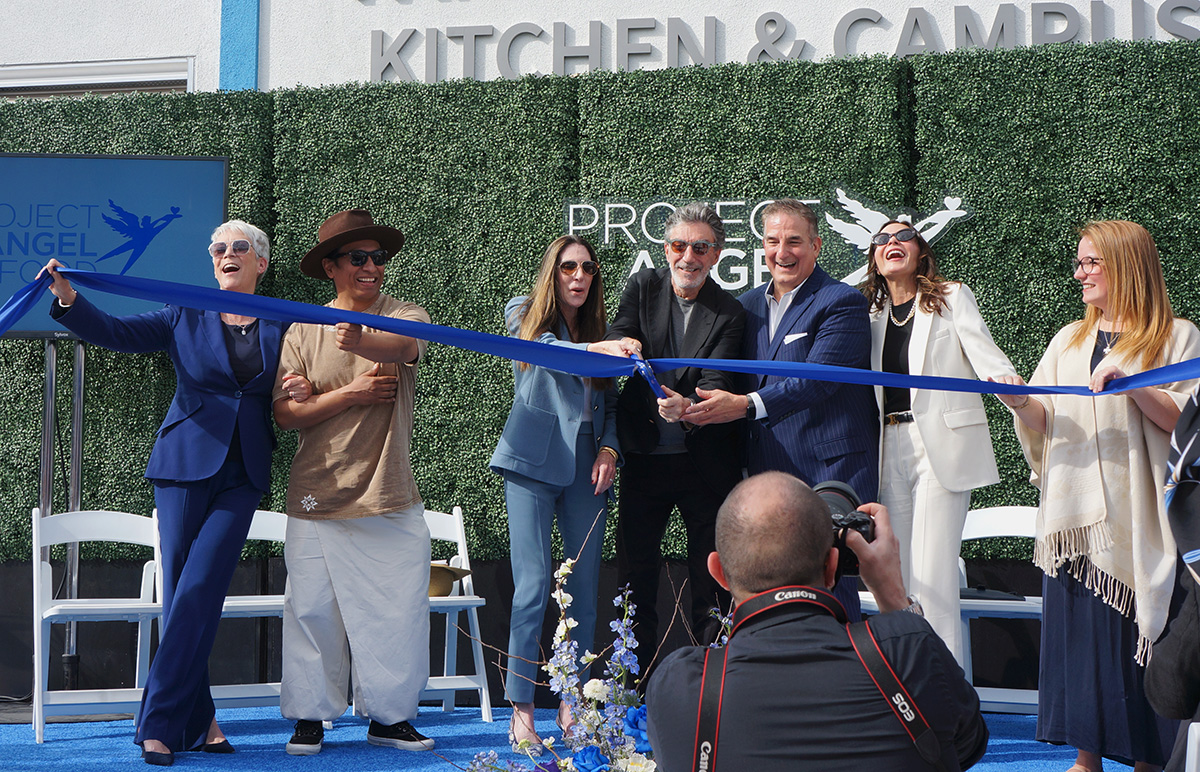
On Feb. 5, community members gathered at 922 Vine Street to celebrate the expansion of Hollywood-based non-profit Project Angel Food. That Thursday morning, the organization cut the ribbon for its Chuck Lorre Family Foundation Kitchen and Campus: one of two new buildings that greatly increase its capacity to provide healthy food and nutritional resources to the county’s critically ill community members.

Project Angel Food was founded in 1989 by author and activist Marianne Williamson and blossomed from a dire need to feed people impacted by HIV/AIDS during the epidemic. Today, the organization cooks and delivers over 1.5 million meals, tailored to specific needs that include chronic illnesses and gastrointestinal issues, to 5,000 people across Los Angeles.
In August 2023, the organization launched its “Rise to the Challenge” campaign, a multi-year expansion and renovation project backed by $51 million. Now, its first phase is complete, and its impact is expected to double.
With the new Chuck Lorre Family Foundation Kitchen and Campus, Project Angel Food’s kitchen staff — which, like the rest of the organization, is majorly powered by volunteers — has access to 16,000 square feet of expanded space, which includes more ovens, walk-in freezers, and hot cook lines than they’ve ever had access to previously. Project Angel Food CEO Richard Ayoub explained today that this will allow staff and volunteers to serve 10,000 people a day.
The organization’s executive chef, John Gordon, explained to the Blade that “space issues” were a major hindrance previously. Before the new kitchen was opened, staff worked out of a much smaller Lincoln Heights facility. “If you didn’t get the rack, you don’t have the sheet pans. If you got the sheet pans, you don’t have the last chiller,” Gordon said, explaining how difficult it was before to balance multiple tasks in the same space. Now, their team of seven chefs, 12 kitchen assistants, dishwashers, and volunteers can work in several cook lines at the same time.
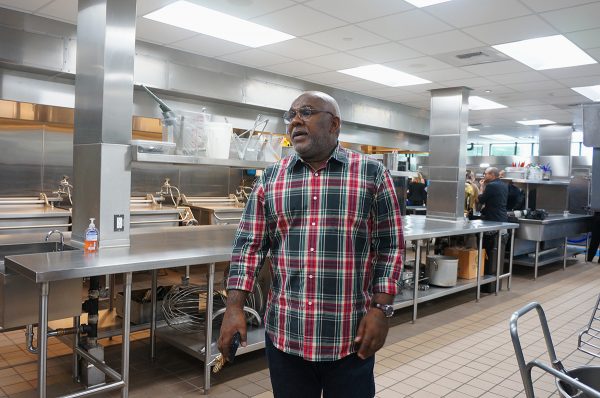
“We’re much more efficient this way,” Gordon continued. In the kitchen, the day begins at 8 a.m. Someone will pick music for the morning, setting a groove for staff as they sync up to review recipes, pack meals prepared from the day before, and cook meals for the next day ahead. After a lunch break, they continue to work until 4 p.m. to make sure they’re meeting the needs of the community they serve.
For locals like Celeste, a Project Angel Food client who is affected by multiple sclerosis, this service is crucial. On days the disability “really takes effect,” being able to receive nutritious meals customized to her needs makes a meaningful difference. “Some days, I’m not able to get up,” Celeste said. “Just that one meal [can] give me an extra boost [and] allow that sun to shine brightly even on my rainy days.”
For advocates and Project Angel Food supporters, Thursday’s celebration was also an act of resistance and a bold declaration against the federal administration. Jamie Lee Curtis, the honorary co-chair of the “Rise to the Challenge” campaign, spoke of the “love” that lay at the core of Project Angel Food’s foundation: a kind of love she finds completely absent in the federal administration.
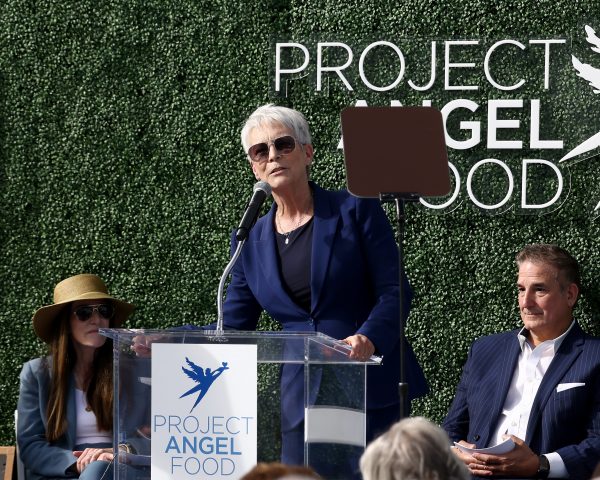
“We are a community here today the same way they are in Minnesota, and I feel like what they’re doing is what we’re doing,” Curtis said to the crowd, defiance firm in her voice. “And we’re only going to get any shit done if we do it together and defy these motherfuckers.”
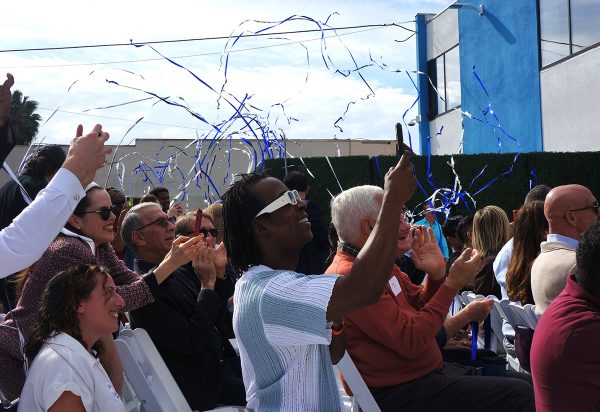
County supervisor Lindsey Horvath, a former delivery volunteer at Project Angel Food, affirmed this statement and guaranteed the county’s continued support in the organization. Horvath spoke of the government’s “glaring absence” during the HIV/AIDS epidemic: one that is “eerily similar” to its attitude now.
As the government mobilizes Immigration and Customs Enforcement (ICE) agents, sending immigrant communities spiraling into crisis, on-the-ground organizations like Project Angel Food are standing in firm support of their marginalized and ill community members. Horvath’s confirmation of county support is also rooted in this mission.
The building’s exterior also reflects the organization’s dedication to its residents. On the south side, a new large-scale mural painted by esteemed local muralist Robert Vargas highlights the stories of local volunteers and vendors who live and work in the neighborhood. Vargas explained that seeing these people in action “crystallized” the dedicated service and harmony that exists among the organization’s volunteers, clients, staff, and nearby community members.
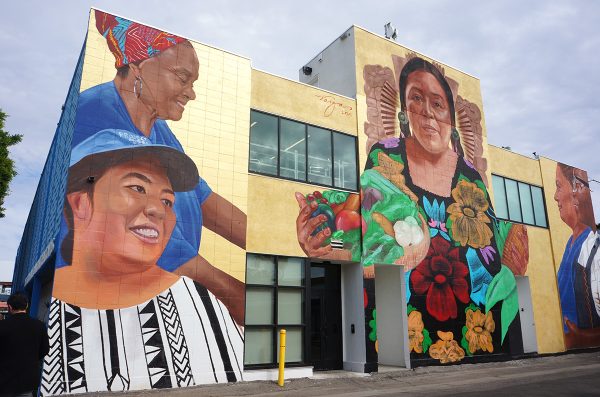
Next, the second building of the Chuck Lorre Family Foundation Kitchen and Campus begins construction this summer. This space will house the organization’s nutrition, volunteer, and client services and will also include its first department dedicated to research and policy. There will also be a training kitchen, where clients will be able to learn how to cook meals on their own.
As Project Angel Food’s growth continues, Ayoub hopes community members who are able to pitch in will do so. While public funding can feel unsteady, he explained, community strength and sustainment can fill those gaps of doubt. The organization is $2.3 million away from its goal in securing capital for this second building, and Lorre will match donations up to $1.5 million.
Kristie Song is a California Local News Fellow placed with the Los Angeles Blade. The California Local News Fellowship is a state-funded initiative to support and strengthen local news reporting. Learn more about it at fellowships.journalism.berkeley.edu/cafellows.
Arts & Entertainment
2026 Best of LGBTQ LA Readers’ Choice Award Nominations
Nominations for the Best of LGBTQ LA Awards are open from until February 15th!

It’s time to celebrate the vibrant and diverse LGBTQ+ community of Los Angeles! Nominations for the Best of LGBTQ LA Awards are open from until February 15th, giving you the chance to highlight your favorite local legends, hotspots, performers, and change-makers. Then, from February 23rd to March 6th, cast your vote for the finalists and help decide who truly represents the best of LGBTQ LA. The Best of LGBTQ LA Awards Party will be held on March 26th at The Abbey!
Use the form below or click the link HERE to nominate!
-

 Bars & Parties4 days ago
Bars & Parties4 days agoSoCal queer singles come together as we celebrate LA’s Top Eligible LGBTQ Singles at the Abbey this Thursday!
-

 Commentary5 days ago
Commentary5 days agoAre we done with ‘Drag Race?’
-
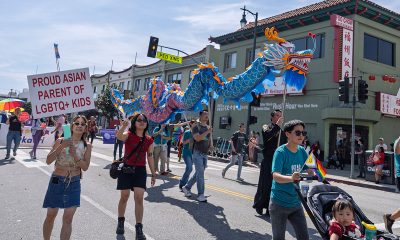
 Features4 days ago
Features4 days agoFrom the Desk of AJSOCAL: How the QTAPI community celebrates Lunar New Year
-

 Theater3 days ago
Theater3 days ago‘Incitation to the Dance’ asks what happens to love when a younger man cuts in
-

 Puerto Rico4 days ago
Puerto Rico4 days agoBad Bunny shares Super Bowl stage with Ricky Martin, Lady Gaga
-

 Philippines3 days ago
Philippines3 days agoPhilippines Supreme Court rules same-sex couples can co-own property
-

 New York3 days ago
New York3 days agoPride flag removed from Stonewall Monument as Trump targets LGBTQ landmarks
-
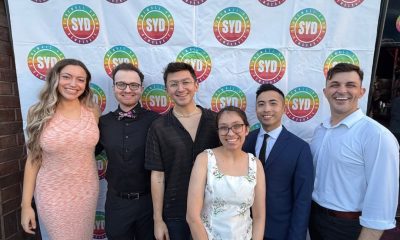
 Los Angeles2 days ago
Los Angeles2 days agoStonewall Young Democrats bounces back from “quiet year” with Hero Awards
-

 Florida3 days ago
Florida3 days agoDisney’s Gay Days ‘has not been canceled’ despite political challenges
-

 Italy4 days ago
Italy4 days agoOlympics Pride House ‘really important for the community’



